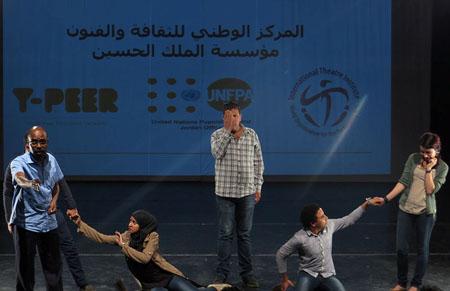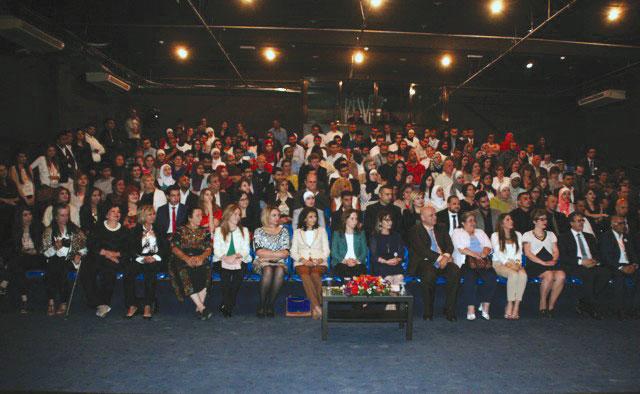You are here
Taboos tackled through theatre at NCCA workshop
By Muath Freij - Oct 16,2016 - Last updated at Oct 16,2016
AMMAN — At a workshop in Amman, 22-year-old Najlaa Ali hopes to use theatre to highlight the problem of early marriage in Syria.
“This issue has increased very much during the crisis. Theatre is a tool I will use to highlight this... because many girls are suffering from it,” she told The Jordan Times in a recent interview.
Ali is one of 25 students from across the Middle East who participated in the six-day Regional Theatre Based Techniques training course, conducted by the National Centre for Culture and Arts (NCCA) in cooperation with UNFPA.
For Ali, the course was her first opportunity to leave Syria which and a chance to immerse herself in acting.
“I also learned from my colleagues and learned their culture and traditions,” she added.
One of the topics tackled in the course was AIDS, she noted.
“My graduation project was about people suffering from AIDS and I really care about this issue, because I know people who suffer from this syndrome,” Ali said.
NCCA Director General Lina Attel said the workshop participants were from civil society organisations, cultural institutions and universities in 11 countries across the region.
“This specialised training course is the only one in the region utilises theatre skills and participatory drama methodology to deliver effective dynamic messages through performing arts,” Attel told The Jordan Times.
The course focuses on providing a counter narrative to radical behaviour and extremist ideologies pertaining to gender based violence, stigmatisation, reproductive health and rights, respect for cultural diversity and civic engagement for social development, she explained.
The training is accredited by the International Theatre Institute, UNESCO and UNFPA.
Theatre is accepted by all societies because it tells stories, and all people enjoy storytelling, according to Attel, who said drawing audiences to plays is not a problem.
“Teaching the art of theatre in schools is really important and it is important to equip people with skills,” she added.
The issues tackled in the 40-hour course are controversial, said Attel, noting that the subjects addressed do not receive enough attention in the community, in the educational system or in health institutions, like sex education.
For Mohammad Hassouneh, a 25-year-old from Jordan, the course gave him the tools to communicate difficult messages in an artistic, civilised way.
“The culture of theatre in Jordan is widening and I can express my energy and feelings here,” he added.
The course was part of the “Y-PEER” initiative, which is a youth-to-youth education initiative led by UNFPA and works in areas of young people’s sexual and reproductive health, including HIV/AIDS, physical and mental health, maternal health, gender based violence, youth engagement and the development of a culture of citizenship.
Related Articles
For Mohammad Mahjoub, receiving training at the National Centre for Culture and Arts (NCCA) was not only a chance to learn more about ways to utilise theatre to raise awareness on key issues, but also an opportunity to meet new friends.
The National Centre for Culture and Arts (NCCA) has recently concluded the second Regional Theatre Based Y-PEER Training of Trainers titled “Performing Arts for Action” in cooperation with the UNFPA.
For Abdul Jaleel Naser from Yemen, theatre is the best way to deliver a specific message.













